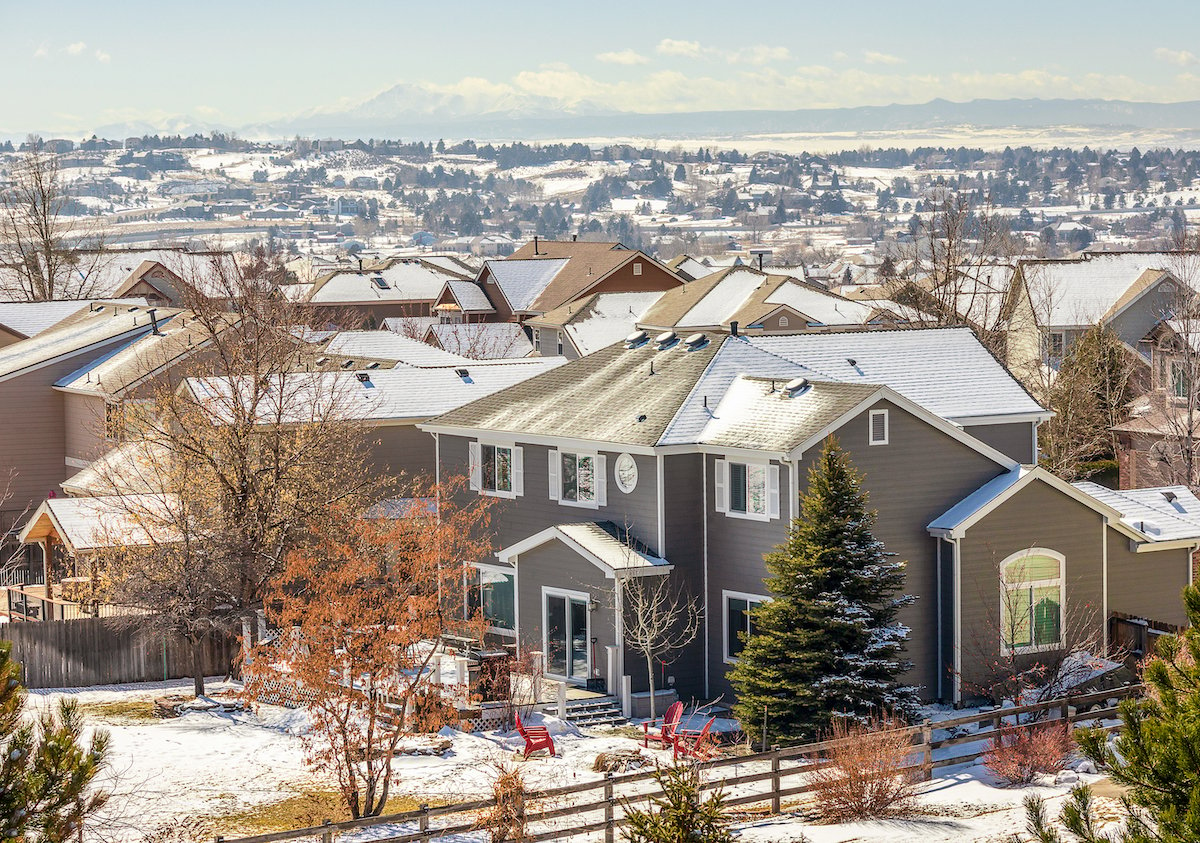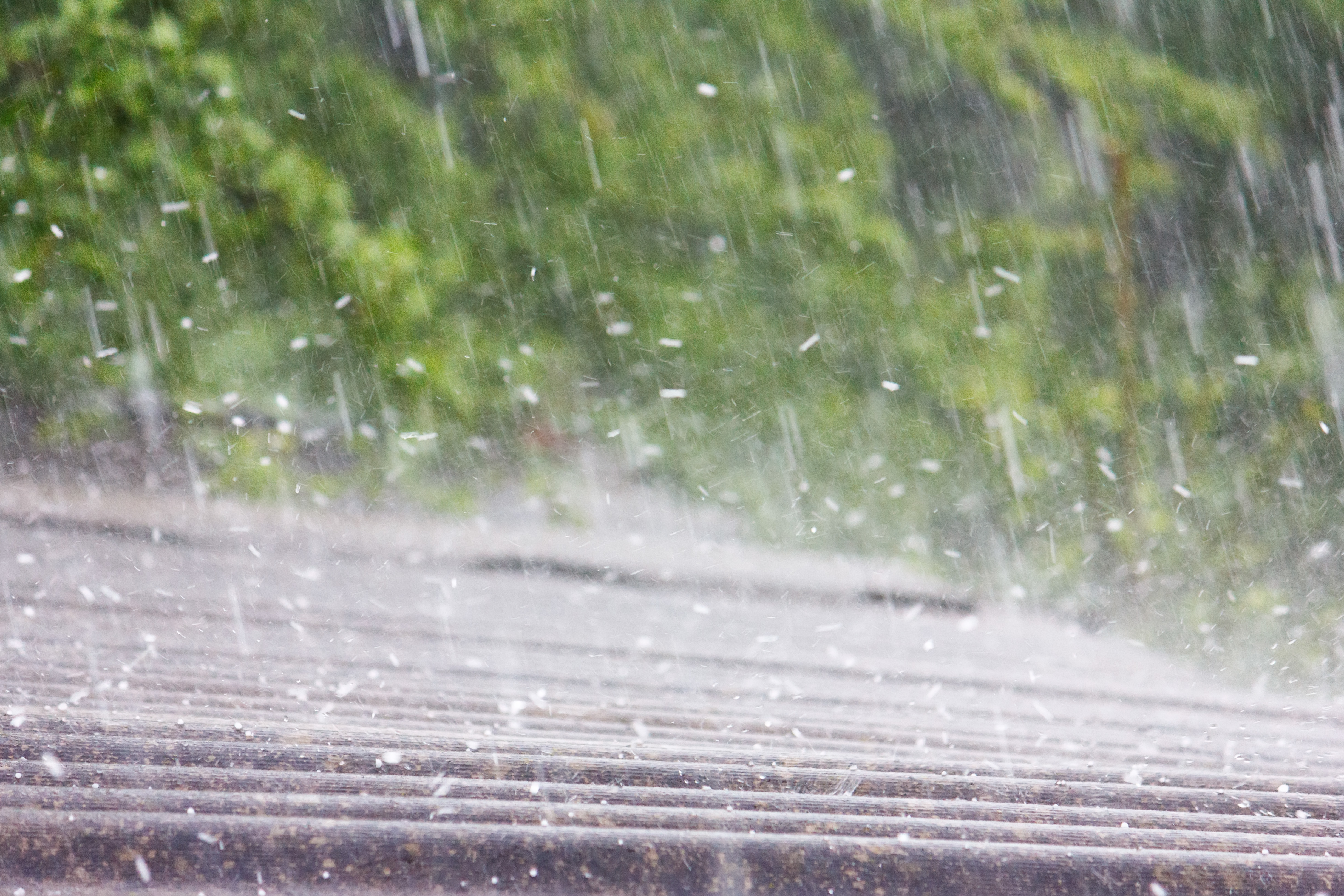There are many things that residents in Colorado Springs need to consider after a hailstorm. Your roof is one of them! But the last thing you want to do is put yourself in a situation that ends up costing you more money in the long run. Here are 12 roofing mistakes that Colorado Spring's residents make and how you can avoid them.
MISTAKE #1: Calling The Claims Department Of Your Insurance Company
After a hailstorm, many people wrongly assume that the first thing they should do is call their insurance company's claims department. After all, when we get in an auto accident, after we exchange information with the other driver and fill out the police report, the first thing we do is call the insurance company to report the accident. Homeowners tend to think this way also regarding their roofs. If there's a hailstorm in their neighborhood, all of a sudden roofers' signs start popping up in their neighbors' yards, and they think, “Wow! There must be damage on these other houses. My house is probably damaged too!”
The reason they do this is because they want someone to check their roof and property for any hail damage. The problem is that inspecting for damage is NOT the insurance adjuster's job. His job, when he arrives at your house, is to assess the value of damage to your house. He's not there to see if there is damage or not. He's there to find out how much damage there is and arrive at a price to repair it for you.
Once you call the claims department and tell them you want your roof or house looked at, they are filing a claim for you. Whether you have damage or not, you now have a claim on your record. Actually, with many insurance companies, having a “claim without pay” (or CWOP), or a zero-pay claim, on your record, counts just like any other claim on your record. It can affect your insurance rates, and affect your ability to shop around for insurance from other companies.
What Should You Do?
If your neighborhood is hit by a hailstorm, DO NOT call your insurance company's claims department. Here are some options for what you can do, in priority:
- If you have worked with a roofing contractor in the past, especially if that company installed your roof, and you had a good experience with them, call that company first and request an inspection. Every roofing contractor that I'm aware of in El Paso County will do a free inspection for you.
- If you do not have a contact with a roofer, ask your friends, family, neighbors, or co-workers if they have one they can recommend. DO NOT use a roofer who has simply planted a sign in your neighbor's yard, but who has done no work for your neighbor yet.
- Call your insurance agent – not the claims department. Nearly every insurance agent has a few roofers that he/she knows or is comfortable referring
It's always best to work with a company who has been referred to you by someone who has worked with that company before. Avoid hiring a door-to-door company or finding someone by doing a Google search. If you don't have someone you can call, please call Homestead Roofing.
MISTAKE #2: Letting A Door-knocker On Your Roof
Not every roofer who knocks on your door is going to rip you off, but every “roofer” who is going to rip you off is going to knock on your door. This is because most of these unscrupulous “roofers” have no ties or relationships established here, so door-knocking is the quickest, easiest way for them to get business here.
Door-knockers and canvassers are such a problem in Colorado that the Department of Regulatory Agency (DORA), the Colorado State Attorney General, and several county sheriff's departments all warn citizens to not let anyone in or on your property who knocks on your door.
Some tactics that door-knockers and canvassers use are:
- Wearing reflective safety vests to make you think they're from a government agency or insurance company
- Tell you that they're working at your “neighbor's” even though, in reality, the “neighbor” could be a mile away
- Tell you that one of your neighbors told him to talk to you
- Tell you that he “just happened to be driving by” and noticed major damage on your roof
- Try to coax you out of your house and doorway where you're less likely to be defensive
- If you have a “No Soliciting” sign, he'll tell you he's not selling anything – he's just offering a free inspection
What Should You Do?
Tell any door-knockers, canvassers, or even phone solicitors that you don't need their service and, if they're on your property, that they're trespassing and that they must leave immediately. Never work with a door-to-door contractor, and if you think you need a roofing inspection, call a company you have worked with before, or ask your insurance agent, friends, family, or neighbors for a recommendation to someone they have had a great experience with before. If you don't have someone you can call, please call Homestead Roofing.
MISTAKE #3: Not Using A Local Roofing Contractor
Did you know that there are several software apps for computers and devices that will track hailstorms and report to the user where a storm has occurred? The reports include the specific areas and even the size of the hail that fell. Storm-chasing roofers use this software to tell them where the prime areas in the country are that they should concentrate their marketing and canvassing efforts in order to make sales.
Out-of-town roofers will always try to convince homeowners that they are better off hiring these companies rather than a local company because in the aftermath of a storm, the local roofers “can't handle all the new work load". They tell the homeowners that they can get faster, better service from an out-of-towner. This certainly isn't true.
If you hire an out-of-town roofer and then have a problem that needs a warranty service, even if the roofer is in Denver, how easy do you think it will be to get him and his crew to come back to your area to repair your issue?
How Can You Tell If The Roofer Is Local?
First thing to do is look at his license plate and/or his phone number on his business card or truck. If the license plate is from out of state, or if he doesn't have a local phone number, find a different contractor. You can also contact Pikes Peak Regional Building Department (719-327-2880) if you live in El Paso County, or your local governing authority if you're in a different county. You can also contact the Southern Colorado BBB to check on a business, but it's also a great idea to call your local insurance agent and ask for a recommendation to a local contractor. If you don't have someone you can call, please call Homestead Roofing.
MISTAKE #4: Using A Roofer Who Offers To Pay Your Deductible
It sure sounds good when a roofing contractor tells you that he will take care of paying your deductible, right? I mean, that could save a homeowner hundreds, or even thousands of dollars! But did you know that this is illegal in Colorado? On June 6, 2012, Colorado's governor signed into law SB-38 which states that no roofing contractor may pay, waive, or rebate all or part of a homeowner's deductible or even offer to do so. In fact, every roofing contractor is required to have a statement on his roofing contract saying that he will not pay, waive, or rebate a deductible.
Why Is This Illegal?
On the surface, that's a valid question. Doesn't a business owner have the right to cut into his own profit if that's how he wants to run his business? The problem is that an insurance policy is actually a contract that the homeowner has with his insurance company, and in many cases the policy states that the deductible is the homeowner's responsibility to pay. Therefore, if the roofer is paying the deductible, the owner and the roofer are, in effect, colluding to commit insurance fraud. If the roofer is not going to collect the deductible from the homeowner, then he is invoicing the insurance company for more than he will be collecting from the insured. For example, if the deductible is $1000 and the insurance claim is $10,000, then the roofer has to tell the insurance company that he's charging $10,000 when he's actually only charging the homeowner $9000. If the insurance company knew that the roofer is only charging $9000, they would send the homeowner only $8000.
What Should You Do?
I know that this can all be confusing and that many roofers have several “creative” ways around this law so that the homeowner ends up with a “free” roof. However, the best thing you can do if a roofer offers to pay your deductible is to find an honest roofer – one who will obey the law and not cut corners on the quality of your roof in order to make up for the lost profit he incurs by paying your deductible.
MISTAKE #5: Not Knowing What Your Deductible Is
Imagine your house is damaged by hail, and you file a claim with the understanding that you will be paying your $500 deductible as part of the claim. The adjuster comes out and does his assessment of your damage, tells you that your insurance company will be covering your loss, and that your deductible is $5,100!
Would that be a huge financial blow to you and your family? This scenario actually happened to a family who was working with one of our competitors in 2011. They were shocked. I would have been, too.
Why Does This Happen And How Can You Prevent It From Happening To You?
This happened because the insurance company changed the homeowner’s deductible from $500 to 1% of the value of the home. There are times when that happens, either because of the risk involved to an insurance company, or because the insured has asked how to lower their monthly premium, or other reasons. What you should know is that moving to percentage deductibles is becoming a lot more common in Colorado Springs.
What Should You Do?
Every year you receive, either in the mail, or electronically, your new policy’s declaration page/s. This document has all the changes that have been made to your policy outlined in it. You really should read this document every year, or have your insurance agent explain any of the changes to you. Then, always - before you file a claim - ask your agent or your insurance company what your deductible is for hail damage. This will prevent you from getting a nasty surprise like this other homeowner did!
MISTAKE #6: Not Knowing What Type Of Coverage You Have
There are two basic types of coverage for wind & hail damage on your property: Replacement Cost Value (RCV) and Actual Cash Value (ACV). Your RCV coverage will pay all costs for a full replacement of your roof if it is “totaled” by a storm. An ACV policy will pay only the amount that the roof is actually worth after the depreciation amount has been deducted from the claim. If you have a roof that is 15 years old, then your claims adjuster will account for that when he assesses the value of your claim. This could potentially reduce the amount of your claim by THOUSANDS of dollars.
Why would anyone want an ACV coverage policy?
If they actually knew the details, very few people would probably choose coverage like this, especially here in eastern Colorado, since we get so many hailstorms. The problem is that some roof types will only be covered by Actual Cash Value, so the homeowner may not have a choice if he stays with the insurance company he has. Also, if you have filed a property claim in the past, and did not have the repairs done, your next, future claim will most likely be an ACV claim.
What Should You Do?
If you have an older roof, especially a roof with T-Lock shingles, or if you have filed a claim in the past and did not complete the repairs, you should definitely call your insurance agent before filing a claim for wind or hail damage and ask your agent what type of coverage you have on your roof. An additional question you should ask before filing a claim is whether you have “code upgrade”, also known as “Ordinance and Law.” If you don’t have that coverage, you may end up paying the roofer extra to meet current building codes that were not in effect when your roof was last installed.
MISTAKE #7: Choosing A Roofer Who Is Not Fully Insured
There are two basic types of insurance coverage that a contractor can have and both of them are designed to protect you, the homeowner. General liability insurance is required by El Paso County and Teller County building departments in order for a contractor to obtain a license, and this insurance coverage protects you if anything on your property is damaged. For example, if a workmanship defect results in exterior or interior damage to your home, GL insurance should cover the costs of repair if the contractor chooses to file a claim.
Workmen's compensation insurance, on the other hand, is not required by our local counties in order to obtain a contractor's license, IF the contractor has no employees. Workmen's comp insurance will protect you against liability if someone is injured on your property through no fault of your own.
Here's why this can be such a danger for a homeowner.
A contractor who has no employees can claim to be “fully insured” in El Paso and Teller counties, as long as he only has General Liability insurance but no Workmen's Comp insurance, because that's all he's required to have. However, if someone gets injured on your property and he doesn't have Workmen's Comp insurance, you could get sued by the personal injury lawyers. This actually happened here in 2012 and the homeowner was on the hook for up to $500,000 of medical costs for an injured worker.
The way that many contractors get around the requirement to have WC insurance is by making their estimators and salesmen sub-contractors instead of employees. The problem is that this is a “loop-hole” that they're trying to work to their temporary advantage. The reality is that, in most cases, the estimators and salesmen are not sub-contractors by the legal definition of the term, but are actually employees. In order to work the system to avoid the cost of having to buy Workmen's comp insurance, these contractors are really putting you, the homeowner, at great risk of liability in the event of an injured worker.
What Should You Do?
Only hire contractors who have both General Liability and Workmen's Comp insurance. It is only these contractors who are truly “fully insured” and provide their employees and their clients with the protection necessary. If you're interested in hiring a contractor, ask him to have his insurance agent mail or email you a copy of his insurance coverage certificate. This document will show you what coverage he has, but don't accept a printed copy he hands you; these are way too easy to falsify. Receiving one directly from his agent will help assure you that he actually has the coverage he claims to have. If he balks at your request for this, find a different contractor.
MISTAKE #8: Signing Anything Before The Roofer Gets On The Roof
A common tactic used by some door-to-door roofing canvassers is to knock on a door and ask the homeowners if they want their roof inspected. If they agree, the roofer then asks them to sign a form before he does the inspection. The unsuspecting homeowner, assuming that the form is some sort of permission form or liability waiver, has just signed a contract which, on the surface, obligates the homeowner to use that roofing company to perform the repairs or replacement if their insurance company agrees to accept a claim for any damages.
Things get further complicated for the homeowners if they later decide that they don't want to repair or replace their roof using that contractor. Perhaps they did some research on the roofing company and didn't like what they found. Maybe the homeowners simply want to change their minds and use a different contractor. If this happens, the door-to-door roofer will then tell the homeowners that he will sue them if they try to back out of the “contract.”
What Should You Do?
Do not sign anything before the roofing inspector does his inspection. After the inspection, if you have decided to file a claim, and you want the roofer to work with your insurance company to discuss the scope of work needing to be done, the roofer may ask you to sign a form authorizing him to do so. This is an acceptable practice and is a non-binding document. Any time you're asked to sign something before the inspection, it's a safe bet that it's not going to be for your benefit.
MISTAKE #9: Giving The Roofer Money Up-Front
Even though this is number nine on our list, it is by far the worst mistake someone could make! This is the most common way people get scammed by roofers. What happens is a roofer will tell homeowners that before he can put their roof on the production schedule, they need to give him a deposit payment up-front. This whole practice is actually governed by Colorado law, SB-38 which states that a roofing contractor is not allowed to collect a deposit unless either: 1) the roofing materials have been delivered to the property, or 2) he will hold the deposit money in trust until the materials are delivered to the property.
If you give any deposit money to a roofer before you have materials for the job, and that roofer disappears or just refuses to do the work, you have lost all that money. If it's insurance proceeds, your insurance company will not reimburse you. If you take him to court and the judge rules in your favor, if the roofer simply chooses to ignore the ruling, there's nothing the courts can do about it.
What Should You Do?
If a roofer is telling you that you have to give him any money up-front, for whatever reason, cancel your contract with him and find a different roofer. If he threatens to sue you, call his bluff. He knows he's violating the law, so he's certainly not going to take you to court. If you've encountered a roofer who's canvassing your neighborhood and is asking people for deposit money up-front, warn all your neighbors about his illegal practice.
MISTAKE #10: Not Knowing What The Roofer Is Doing During The Inspection
Even though you probably don't know how to inspect a roof or may not be able to identify hail damage, or you may not even want to get on your roof, it's still a good idea to know what the roofer or the roof inspector is doing while he's on your roof. There are so many scammers out there who are desperate for any and every sale that there's a lot of temptation to vandalize your roof to try to get an insurance adjuster to accept a claim. Common vandalizing practices include hitting the roof with a ball peen hammer, hitting it with a golf ball wrapped in a sock, putting a dime or quarter on the roof and spinning it with his thumb, or even walking on the roof with football cleats on.
What Should You Do?
If possible, try to be home during the inspection. Stand in your yard and watch him as he's doing his inspection. Ask lots of questions. If something looks unusual or suspicious to you, ask him about it. A good, honest roofing contractor will welcome your questions and actually be glad that you're asking them. A dishonest roofer will become irritated with you or will give you suspicious-sounding answers.
MISTAKE #11: Not asking if the roofing salesman is an employee or a sub-contractor of the company he represents
Recently we wrote about Mistake #7, which is hiring a roofer who does not have Workers’ Comp insurance. In El Paso County, to obtain a roofing contractor's license, the contractor must have general liability and workers’ comp insurance IF he has employees. If he doesn't have any employees, he's not required to have workers’ comp insurance. Workers’ comp insurance is pretty expensive, so the way many roofing contractors get around this requirement is that they make their canvassers, inspectors/estimators, salesmen, and project managers “sub-contractors” instead of employees. That may seem legitimate, but in many cases, it is a clear violation of Colorado's labor laws.
What Should You Do?
Ask the company representative if he is an employee or a sub-contractor. If he says that he is a sub-contractor, ask him for proof of having workers’ comp insurance for himself. This is too critical to overlook because if he or another uninsured person gets injured on your property, you (or your homeowner's insurance company) could be liable for any medical costs that injured person incurs.
MISTAKE #12: Not asking for your roofer’s license number
In many counties in Colorado, for a roofing contractor to be able to enter into a contract for work with a homeowner he must be licensed in that county. There are exceptions for the more rural counties such as Elbert and Chaffee counties, but the major, populated counties along the metro areas will require licensing. In El Paso County, any work that is greater in scope than $1000 requires a contract between the contractor and the homeowner. If the contractor is not licensed then he is not able to pull a permit for the work he proposes to do on your home.
What Should You Do?
Make yourself aware of your local county’s licensing requirements and then, if applicable, ask your roofing contractor for his license number for your county. You can then contact your local building department and ask if his license is still valid and in good-standing.
What Should You NOT Do?
If a “contractor” ever asks you to pull the permit for your roofing work, that’s a big, red flag. This will probably indicate that the “contractor” is not licensed in your county. Find a real contractor.





